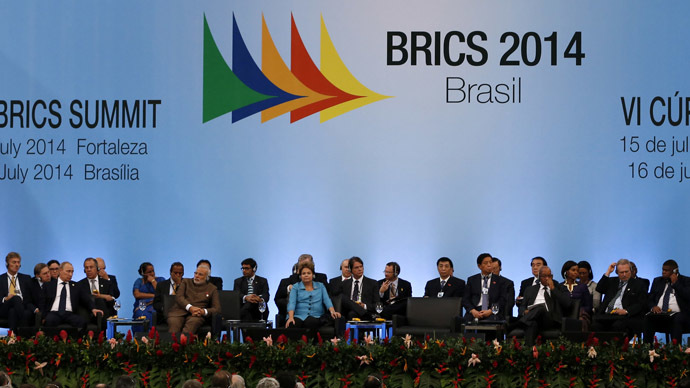BRICS $100bn reserve currency pool to soothe global shocks – Medvedev

The creation of the BRICS reserve currencies pool worth $100 billion will allow member states to depend less on negative processes in the world economy and bypass market volatility, said Russian Prime Minister Dmitry Medvedev.
"Along with the launch of the New Development Bank, it is one of the most important initiatives for countries entering into this association. The agreement establishing a pool of reserve currencies was signed last summer," said Medvedev at a government meeting Thursday.
"Russia is providing $18 billion. Each of the BRICS members may apply to any party to the treaty for loan,” Medvedev said, adding that key decisions will be taken by the Governing Council, which consists of either finance ministers or central bank governors. Russia will be represented by the head of the Central Bank of Russia Elvira Nabiullina.
READ MORE: Russia to be first BRICS country to ratify $100bn currency pool - envoy
"I hope it [the agreement on establishing the pool – Ed.] will not only strengthen our economic cooperation, but also provide the participants of the ‘five’ more independence from the current international financial situation and the problems existing in the international financial institutions," he said adding that it’s one of the most significant practical initiatives of BRICS.
The Government Commission on legislative activities approved Wednesday the bill on the ratification of the agreement to establish the BRICS reserve currencies pool. The ratification of this agreement will help Russia advance its monetary cooperation strategy, particularly in the development of privileged relations with its partners from BRICS, said the Russian government.
READ MORE: BRICS leadership passes to Russia, $100bn development bank ‘main priority’
On July 15, 2014 the member countries signed an agreement to establish the $100 billion BRICS New Development Bank and a reserve currency pool worth another $100 billion. The bank is a rival to western financial systems and is expected to counter their influence on the global economy.
BRICS is an informal interstate association of Brazil, Russia, India, China and South Africa with a total population of 2.83 billion people (42 percent of the global population). BRICS countries occupy 26 percent of the global area with their total GDP is $15.435 trillion, which is 14.6 percent of world GDP.












